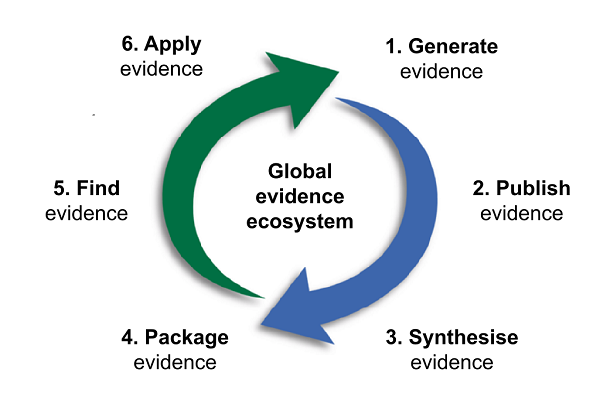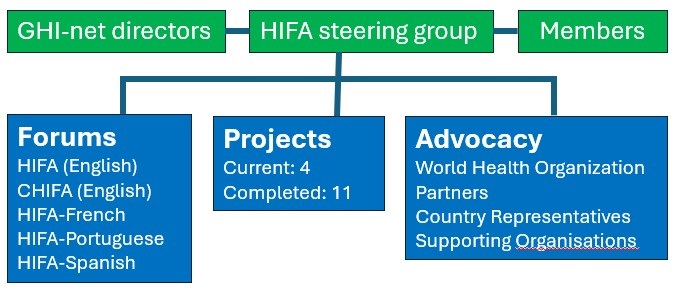See also HIFA Strategy 2025-2027
"The most urgent task before us is to get medical and health knowledge to those most in need of that knowledge." James Grant, former Executive Director, UNICEF, 1993
"The challenge is to ensure that everyone in the world can have access to clean, clear, knowledge." Pang T et al. The Lancet 2006
HIFA (Healthcare Information For All) is a global campaign working in official relations with the World Health Organization. Our goal is universal access to reliable healthcare information: a world where every person, every health worker and every policymaker has access to the information they need to protect their own health and the health of others, and thereby help prevent millions of deaths every year. This goal can only be achieved by strengthening the global evidence ecosystem (below). HIFA does this by promoting communication (HIFA forums), understanding (HIFA projects) and advocacy among all stakeholders: more than 20,000 members in 180 countries representing every part of the global evidence ecosystem.
Universal access to reliable healthcare information
Universal access to reliable healthcare information implies that every person and every health worker has access to the healthcare information they need to protect their own health and the health of others. By definition, such information should be:
- accurate and up to date;
- unbiased and reflect, as far as possible, the cumulative evidence based on robust research;
- in the appropriate language and format, and at the right technical level;
- relevant and applicable to the person’s immediate situation (which is always changing).
Every person should also be empowered to differentiate reliable healthcare information from the barrage of misinformation that does not fulfil these criteria.
The concept of 'universal access' includes past as well as current access to reliable healthcare information. What matters is that every person has the reliable healthcare knowledge they need to inform health decisions, whether this is through past or current exposure to reliable healthcare information.
Note: HIFA's definition of universal access does not mean that all information should be open access. Open access is an enabler of universal access but is neither a prerequisite nor sufficient for meeting information needs.
HIFA's purpose: to strengthen the global evidence ecosystem

HIFA aims to strengthen the global evidence ecosystem by addressing three intrinsic weaknesses in the system, identified in a paper in The Lancet in 2004: poor communication among stakeholders in the system; poor understanding of information needs and how to meet them; and a profound lack of advocacy for universal access to reliable healthcare information as a global health issue. HIFA supports communication through global discussion forums in multiple languages; and it builds understanding through a range of sponsored projects (in-depth explorations of priority topics). HIFA's forums and projects together provide the basis for evidence-informed advocacy for universal access - see HIFA organisational structure below and the HIFA Strategy 2025-2027.
Clearly HIFA cannot address this enormous challenge alone but we CAN do it through collaboration. That is why we are working in official relations with the World Health Organization; why we have successfully advocated for official policy statements from the world's doctors (see World Medical Association statement) and the world's library and information professionals (see International Federation of Library Associations statement); and official endorsemenets from 400 supporting organisations worldwide. We are actively seeking similar policy statements from other professional groups such as the world's medical journal editors, and from the World Health Organization (which implicitly supports universal access in its Constitution but has not yet made this explicit).
Note: HIFA's primary purpose is to strengthen the global evidence ecosystem as above. It is not to provide healthcare information per se, although such information is incidentally shared among members on our forums. We also have a secondary remit to promote the work of reliable healthcare information providers such as the World Health Organization.
HIFA Organisational structure
HIFA is administered by the Global Healthcare Information Network, a UK-registered non-governmental organisation in official relations with the World Health Organization since 2022.

Notes
- The HIFA Steering Group is an informal group of HIFA volunteers who provide technical guidance on the implementation of HIFA activities
- HIFA has more than 20,000 members in 180 countries, interacting on five Forums in four languages
- CHIFA focuses on child health and rights and is jointly administered with the International Child Health Group and the International Society for Social Paediatrics and Child Health
- Projects are sponsored, in-depth explorations of priority topics
- Partners are organisations that provide practical support (financial or technical), including donations and sponsorship of Projects and other activities
- HIFA operations (Forums, Projects, Advocacy) are enabled by a series of volunteer working groups (Partnerships and Projects; WHO Collaboration; Social Media; Fundraising…)
- GHI-net/HIFA is in official relations with the World Health Organization, with an agreed HIFA-WHO Collaboration Plan 2025-7 to accelerate progress towards universal access to reliable healthcare information
- 400 Supporting Organisations have officially endorsed the HIFA vision of universal access to reliable healthcare information.

